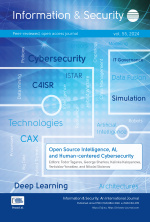Recommendations and Courses of Action: How to Secure the Post-Covid Future
Source:
Transatlantic Security: Securing the Post Covid Future,p.18-41
(2020)
Publisher:
Federal Ministry of DefenseAbstract:
The recommendations contained in this report are the outcome of an online virtual transatlantic security brainstorming event designed to look at securing the future post COVID-19, flag issues and develop recommendations for policymakers. Leading think tanks and defense educational institutions hosted the discussions on six main topics, featuring 2,750 registered representatives from government, international organizations, academia, and the private sector. This number included over 160 VIP’s, many at the ministerial and ambassadorial level.
Key recommendations:
- The transatlantic community should initiate an in-depth leadership discussion (using G7, NATO and US-EU formats) on leveraging and strengthening historically established strategic advantages.
- Achieving “strategic complementarity” between NATO and the European Union is a strategically desirable goal. Both NATO and the EU should initiate comprehensive reviews of the US-Europe strategic dialogue on all topics from trade to security with the goal of reaffirming and enhancing transatlantic solidarity.
- NATO and the EU should establish task forces to examine balancing allocation of resources devoted to traditional external threats with those devoted to emerging global threats.
- NATO and the EU should establish and formalize mechanisms to examine and develop comprehensive response strategies to Chinese global efforts to expand influence. Beijing’s European policy during the pandemic provides strong evidence that the EU-China 2020 Strategic Agenda for Cooperation should be seriously overhauled. It is important scrutinize Chinese geo-economics through a security prism, with resulting guidance to the EU Members and aspirants on a unified strategy for their relations with China. A similar approach guiding relations with Russia is also warranted.
- The timing of catastrophic events is often not predictable – but effective responses to such events have much in common. NATO and the EU should formalize mechanisms to develop and robustly coordinate all hazards response capabilities to catastrophic events with the pandemic experience as a driving force. Important here is to ensure supply chain continuity. Resilient, dependable and diverse supply chains, involving trusted allies and partners, are essential for effective national and regional responses to pandemic-like threats.
- The EU should create a Strategic Communications Task Force dedicated to countering hostile competitor campaigns designed to undermine EU public opinion; e.g. Chinese, Russian, Iranian, Islamist, and others.
- Artificial Intelligence (AI) has much to offer in enhancing readiness and response to pandemic-type events, but often not without potentially far reaching implications for individual freedoms and civil liberty. Creating EU or NATO task forces or advisory/study groups charged with enhancing compatibility of legal and ethical frameworks with the use of AI in military applications is an option worth considering.
27
Views
214
Downloads
Connections: The Quarterly Journal
19,
no. 3
(2020):
5-12.
Information & Security: An International Journal
45
(2020):
35-55.
